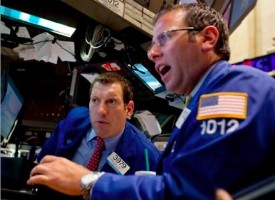There is massive pressure mounting for central banks to end QE.
July 16 (King World News) – Peter Boockvar: I mentioned yesterday that on my wish list of questions of Jay Powell was the request for data proving the economic effectiveness of QE. Today, the House of Lords Economic Affairs Committee which includes the former Bank of England Governor Mervyn King published a report saying “Bank of England must spell out the risks of QE.” This is easily the most high level criticism of quantitative easing that I have ever seen. This Committee took part in this analysis for the following reasons:
1) The quantitative easing programme has not been subject to sufficient scrutiny, including in Parliament, given its size, longevity and economic importance.
2) To examine the extent to which quantitative easing has achieved its stated objectives, along with its effects on the real economy, growth and inflation.
3) To examine the most significant risks to the public finances that might result from quantitative easing, given that the Bank of England now holds a substantial portion of the debt issued by the Government.
4) To find out the Bank of England’s plans for quantitative easing in the future.
Here is what the Chair of the Economic Affairs Committee said, Lord Forsyth of Drumlean:
“The Bank of England has become addicted to quantitative easing. It appears to be its answer to all the country’s economic problems and by the end of 2021, the Bank will own an eye-watering £875bn of Government bonds and £20bn in corporate bonds.
“The scale and persistence of QE—now equivalent to 40% of GDP—requires significant scrutiny and accountability. However, the Bank has faced few questions until now. Going forward, the Bank must be more transparent, justify the use of QE and show its working. The Bank needs to explain how it will curb inflation if it is more than just short term. It also needs to do more to mitigate widening wealth inequalities that have resulted from rising asset prices caused by QE.
“We took evidence from a wide range of prominent monetary policy experts and practitioners from around the world. These included former central bankers from the Fed, the ECB and the Bank of Japan. We found that central banks all over the world face comparable risks.
“QE is a serious danger to the long-term health of the public finances. A clear plan on how QE will be unwound is necessary, and this plan must be made public.”…
To learn which company billionaire Eric Sprott bought a
$10 million stake in click here or on the image below

What were committee’s findings?
1) During the course of the Committee’s inquiry, it became apparent that the Bank of England is widely perceived to be using QE to finance the Government’s deficit during the COVID-19 pandemic.
2) It must be more open about its “assessment processes” for calculating how much QE is necessary to meet its objectives and break down the effect of QE at each stage of the programme in order to show whether it achieved the Bank’s stated targets.
3) The Chancellor refused the Committee’s requests for him to publish the contractual document (the ‘Deed of Indemnity’) between HM Treasury and the Bank of England which sets out the taxpayer liability to cover any financial losses suffered by the Bank as a result of QE. It remains hidden from public scrutiny. The Committee calls again for its immediate publication.
4) The Bank has not set out a plan to reverse QE. First it said it would raise interest rates before reversing QE, but now it is considering reversing QE before raising interest rates. The Bank must set out its rationale for changing its policy and set out a clear exit strategy, particularly considering the growing debate on inflation.
5) QE has been effective at stabilising financial markets during periods of economic turmoil. However, it has had only limited impact on growth and aggregate demand over the last decade. Furthermore, there is little evidence to show that QE increased bank lending, investment, or that it had increased consumer spending by asset holders.
6) The Chancellor has updated the Bank of England’s mandate to support the transition to net zero carbon emissions. This risks forcing it into the political arena. The Chancellor must clarify the Government’s expectations.
Someone please send this report to Jay Powell and his colleagues at the Federal Reserve and tell Congress to run a similar review. https://committees.parliament.uk/committee/175/economic-affairs-committee/news/156630/bank-of-england-must-spell-out-the-risks-of-quantitative-easing-says-lords-report/
I bring this up because the pressure on all central banks to trim QE is only intensifying.
The Bank of Japan met and there were no surprises. They did elaborate on their climate change approach which is just another expansion of central bank mission creep but he did say that it’s ‘inappropriate for the BoJ to decide what’s green.’ Kuroda repeated his obsession with 2% inflation, now going on 8 years, said they do not intend to reduce bond buying and even said again that they ‘won’t hesitate to add easing if needed.’ Easing of what at this point? He said nonsensically that monetary policy helps to reduce inequality. He truly is delusional.
***Also just released: For The Gold Market This Is The Bottom Line For The LBMA And Banks Now That Basel 3 Is In Effect CLICK HERE.
***Also just released: GOLD: Deju Vu And Next Price Target Is $2,220 CLICK HERE.
© 2021 by King World News®. All Rights Reserved. This material may not be published, broadcast, rewritten, or redistributed. However, linking directly to the articles is permitted and encouraged.







